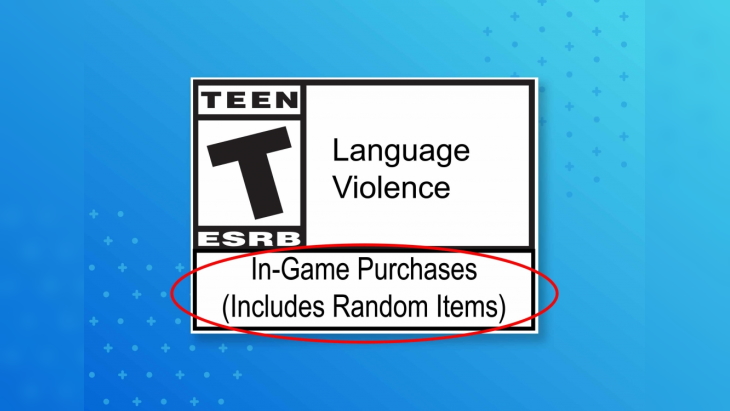
The Entertainment Software Rating Board (ESRB) have announced they will be adding content warning on games with lootboxes and similar mechanics.
In the ongoing controversy surrounding lootboxes, several governmental bodies within nations, and their politicians [1, 2, 3, 4, 5] threatened to take legal action against developers.
EA even removed premium currency from FIFA 18 and FIFA 19 after Belgium authorities deemed lootboxes as being on-par with gambling. In addition several companies pulled their games from service within Belgium.
Now, the ESRB will introduce a new content warning label to boxes (pictured above). “To provide even greater transparency about the nature of in-game items available for purchase,” the blog post explains “the ESRB will now begin assigning a new Interactive Element.”
In 2018, the ESRB approved mandating of including labels on games that contain in-game microtransactions and post-launch downloadable content. This “In-Game Purchases” warning can now be expanded to “In-Game Purchases (Includes Random Items).”
The exact definitions the ESRB will be relying on are as follows:
“This new Interactive Element, In-Game Purchases (Includes Random Items), will be assigned to any game that contains in-game offers to purchase digital goods or premiums with real world currency (or with virtual coins or other forms of in-game currency that can be purchased with real world currency) for which the player doesn’t know prior to purchase the specific digital goods or premiums they will be receiving (e.g., loot boxes, item packs, mystery awards).
In-Game Purchases (Includes Random Items) will be assigned to all games that include purchases with any randomized elements, including loot boxes, gacha games, item or card packs, prize wheels, treasure chests, and more. Games that have the In-Game Purchases (Includes Random Items) notice may also include other non-randomized paid elements.
The original In-Game Purchases notice will still be assigned to games that offer any other type of purchase, including additional levels, cosmetic items, DLC, expansions, etc. However, going forward it will not be assigned to games with “loot boxes” or similar mechanics to ensure consumers clearly understand when the game offers purchases with randomized elements.”
The ESRB state this was introduced now due to two factors “According to research,” the ESRB state, “parents are far more concerned about their child’s ability to spend real money in games than the fact that those in-game purchases may be randomized.”
They also state that “many game consumers and enthusiasts (not necessarily parents) have reached out” to them, asking for identifiers on games with random purchases.
The term “loot box” was also avoided, as the term “doesn’t encompass all types of randomized in-game purchase mechanics.”
The label “accounts for loot boxes and all similar mechanics that offer random items in exchange for real-world currency or in-game currency that can be purchased with real money.”
What do you think? Sound off in the comments below!